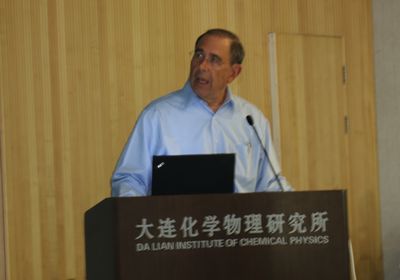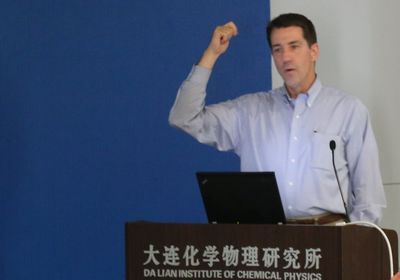Scientists from NIH visited DICP and gave lectures on translational medicine
The aim of translational research is to translate achievement in basic research arena into clinical application more efficiently and do favor to improve public health condition or service. Translational research is now becoming one of the major subjects of biotechnology department of DICP. Director C.P. Austin from the National Center for Advancing Translational Sciences (NCATS), National Institutes of Health and director John I. Gallin from the Clinical Center, National Institutes of Health visited DICP on May 31st, 2014. They were invited by Professor Shengli Yang to give lectures on translational medicine. Scientists from biotechnology department and the relevant groups participated in the seminar.
The lectures were presided by Prof. Guowang Xu. In the opening addressing, deputy-director of DICP, Prof. Xueming Yang warmly welcomed two scientists from the NIH. He gave a high appraisal to the achievement of NIH in translational researches and advocating translational researches around the world. He also indicated that DICP is doing great effort on translational research and it’s a good opportunity for us to construct cooperation with NIH.
Dr. Gallin gave a lecture on the role of the NIH clinical center in translational and clinical research. He pointed out that NIH has set up a unique center integrating clinical and research activities, which leads translational research around the world. All the research efforts in this center aim at solving clinical problems. With the advantage of the clinical and research resource, the center is possible to rapidly translate scientific observations and laboratory discoveries into new approaches for diagnosing, treating, and preventing disease. NCATS was founded in 2011 and Dr. Austin was appointed as the first permanent director in 2012. He mentioned that the mission of NCATS is to catalyze the generation of innovative methods and technologies which could enhance the development of testing, implementation of diagnostics and therapeutics across a wide range of human diseases. He also briefly introduced some new advances in NCATS regarding new compound screening, chip arrays and robotic techniques in translational research.


At the end, Prof. Shengli Yang introduced the main research of DICP and biotechnology department to the guests. After lectures, two guests visited some labs of biotechnology department. (reported by Peng Gao, photo by XiaoliHou).